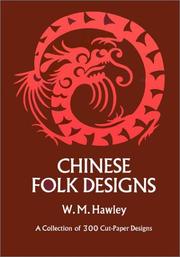| Listing 1 - 3 of 3 |
Sort by
|
Book
ISBN: 0835126188 7800522571 Year: 1993 Publisher: Beijing Sinolingua
Abstract | Keywords | Export | Availability | Bookmark
 Loading...
Loading...Choose an application
- Reference Manager
- EndNote
- RefWorks (Direct export to RefWorks)
S16/0250 --- S17/1701 --- China: Literature and theatrical art--Popular poetry, folksongs, storytelling --- China: Art and archaeology--Papercutting --- S16/0495 --- S16/0475 --- China: Literature and theatrical art--Juvenile literature --- China: Literature and theatrical art--Popular literature (incl. fairy tales, legends)

ISBN: 0486226336 9780486226330 Year: 1971 Publisher: New York Dover Publications
Abstract | Keywords | Export | Availability | Bookmark
 Loading...
Loading...Choose an application
- Reference Manager
- EndNote
- RefWorks (Direct export to RefWorks)
S17/1700 --- S17/1701 --- S17/0410 --- China: Art and archaeology--Folk arts: general --- China: Art and archaeology--Papercutting --- China: Art and archaeology--Symbolism in Chinese art, iconography --- Decoration and ornament --- Embroidery --- Signs and symbols --- Representation, Symbolic --- Semeiotics --- Signs --- Symbolic representation --- Symbols --- Abbreviations --- Omens --- Semiotics --- Sign language --- Symbolism --- Visual communication
Book
ISBN: 9780252081408 9780252039881 9780252097997 0252097998 0252039882 0252081404 Year: 2015 Publisher: Urbana University of Illinois press
Abstract | Keywords | Export | Availability | Bookmark
 Loading...
Loading...Choose an application
- Reference Manager
- EndNote
- RefWorks (Direct export to RefWorks)
"Yan-an, China was the main organizing site of Chinese communism from 1935 to 1949. As the final destination of the Long March and center of the 'red bases,' it acquired mythical status during the Maoist period as the symbol and epitome of the Communist Party's triumph. Yet in the post-Mao period, Yan-an's significance diminished, along with its role as an emblem of revolutionary heroism. In this study, Ka-ming Wu presents an ethnographic account of contemporary Yan-an. She looks at Yan-an today to see what happened to that society and culture in the post-socialism era. Wu examines new dynamics between state and society in light of how rural residents in northwest China make sense of rapid social changes. Under Mao, Yan'an's rural culture was stripped of its spiritual contents and reorganized around socialist, anti-imperial rhetoric to glorify communists' socioeconomic reforms. Since the 1980's, rural Ya'an has been reimagined as a hinterland of ancient cultural traditions. Wu documents how revivals of rural practices are reworked within the socialist legacy, including folk paper-cutting, a local form of musical storytelling, and spiritual cults of local deities. Even though Mao had repressed these practices, surprisingly their current revival has brought out the sacredness or urgency of the revolution's legacy. Instead of assuming that ascendant market forces have replaced state socialism, the dominant line about post-Mao China today, Wu probes the various cultural practices in contemporary Yan'an that evade total commercialization. She contends that this public realm contains powerful religious and ritual practices that produce new forms of meaning out of turbulent rural conditions and new dynamics of state-society relations in the post-socialist era"--
Communism --- Post-communism --- Politics and culture --- Social change --- Ethnology --- Communisme --- Postcommunisme --- Politique et culture --- Changement social --- Anthropologie sociale et culturelle --- Social aspects --- Aspect social --- Yan'an Shi (China) --- Xiao yan ta (Xi'an, Chine : Shi) --- Politics and government --- Rural conditions --- Social life and customs --- Politique et gouvernement --- Conditions rurales --- Moeurs et coutumes --- S17/1700 --- S17/1701 --- S16/0250 --- S13A/0400 --- China: Art and archaeology--Folk arts: general --- China: Art and archaeology--Papercutting --- China: Literature and theatrical art--Popular poetry, folksongs, storytelling --- China: Religion--Popular religion: general --- Mœurs et coutumes --- Brauchtum. --- Ethnologie. --- Ethnology. --- HISTORY --- Manners and customs. --- POLITICAL SCIENCE --- Politics and culture. --- Politics and government. --- Rural conditions. --- SOCIAL SCIENCE --- Social change. --- Social aspects. --- Bisacsh --- Political Ideologies --- Communism et Socialism --- Bisacsh. --- Anthropology --- Cultural --- Sheng, Maoye. --- China --- Social life and customs. --- Bolshevism --- Communist movements --- Leninism --- Maoism --- Marxism --- Trotskyism --- Collectivism --- Totalitarianism --- Socialism --- Village communities --- Postcommunism --- World politics --- Culture --- Culture and politics --- Change, Social --- Cultural change --- Cultural transformation --- Societal change --- Socio-cultural change --- Social history --- Social evolution --- Cultural anthropology --- Ethnography --- Races of man --- Social anthropology --- Human beings --- Political aspects --- Yen-an shih (China) --- Yan'an Fu (China) --- Fushi Xian (China) --- Yenan Shi (China) --- Yen-an fu (China) --- Fu-shih hsien (China) --- Fushi (Shaanxi Sheng, China) --- Fu-shih (Shaanxi Sheng, China) --- Yan'an Shi ren min zheng fu (China) --- Yen-an Chuan-ch'ü (China) --- Yen-an Ti-ch'ü (China) --- 延安市 (China) --- Yan'an Diqu (China)
| Listing 1 - 3 of 3 |
Sort by
|

 Search
Search Feedback
Feedback About UniCat
About UniCat  Help
Help News
News